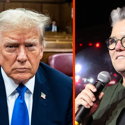
Over the weekend we introduced you to pink professor Kwame Anthony Appiah.
Click here to read part one of Appiah’s exchange with our editor. Today’s conclusion picks up where Saturday’s installment left off.
In today’s piece Appiah offers some more tips on how to be a cosmopolitan, chats about gay marriage, why Obama’s a better candidate than Clinton and tells us why he doesn’t give two hoots about the Anglican’s ongoing gay debate.
Andrew Belonsky: One of things that comes up in your book – not essentially, but is mentioned – is gay marriage. You write that the reason there’s such a fever-pitched battle is that both sides of the debate care very deeply about this institution.
Anthony Appiah: Yes.
AB: I think that can also be split within the gay activists. What exactly is the importance of the institution of marriage? Are people concerned with the equality – with equal rights – or are people concerned with the institution? That’s something that I think about a lot – I don’t personally care right now about getting married, but if it’s something that people want to do, it should be allowed, obviously.
AA: Sure. That’s my view. We should respect the sanctity of marriage as a legal institution. As far as religious practice goes, the public view says, “Well, there are religious practices in our society and societies that have religious tradition.” Gay friendly Anglicans should be arguing with the Anglican church about how they treat people, but not being an Anglican, I don’t think it’s much of my business. As far as the state goes, very strong norms of equality are appropriate. If you provide an institution for one kind of pair of people, I think you should provide it for all pairs. It should be freely available in a non-discriminatory way. A state owes equal respect to all citizens. The exclusion of gay couples from access to marriage is just a manifestation of a failure of equal respect.
AB: What do you make of the federalist argument here in the United States? Say the people in Missouri, they vote to define marriage as one man and one woman, because that’s what they value, what they perceive to be moral, but the people in Kentucky say, “We should legalize gay marriage”. What does that do to American democracy, in your opinion?
AA: Well, here again you have to make a distinction between the legal issues and the ethical or moral issues. If the point of the Missouri legislation is to deny equal respect to gay couples – I don’t care if it’s constitutional or not – it’s wrong. Whether as a matter of politics it’s better to decide these things by state or by federal legislation, I don’t have a big view about that, but I think the denial of this bundle of marriage rights is a breach of fundamental equality. It’s arguable, but it’s so inconsistent with the federal constitution, because the federal constitution has a very strong equality norm in it. Now, the way you decide those questions in the United States is you send it to nine people in Washington and they think about it for a bit and declare their view. I don’t know if whether those nine people would accept that [breach] argument right now. Probably they wouldn’t, because a significant number of them were elected by people who were trying to pick conservatives. So, we might lose that argument at the Supreme Court right now.
AB: Right.
AA: It’s true that those people have a special place in our constitutional system to decide what the law is right now, but I can still appeal the constitutional value even when the court doesn’t have to recognize them. Before Brown v. Board of Education, but after Plessy, when the Supreme Court held the view that separate but equal was consistent with the Constitution, a person who said, “I’m sorry, the court was wrong, there is a fundamentally equality norm that’s breached here and you can’t have separate, but equal” – that person was entitled to make an argument about the interpretation of the constitution. The Supreme Court gets to decide the matter within the system, but the Constitution belongs to all of us. It doesn’t just belong to those nine people. There is a fundamental equality norm in our system and that fundamental norm is denied by people who allow a bundle of marriage rights to straight couples and deny them to gay couples. I think that’s wrong.

Some gay activists can be represented by the inch worm.
AB: I want to talk about something that’s been going on since the beginning of the gay rights movement – we wrote about it last week and it certainly pertains to what you write about: the argument that a gay rights organization should only focus on gay rights. James Kirchick penned an article in The Advocate recently in which he argues against the National Gay and Lesbian Task Force. He gripes that they they cast too wide of a net by opposing racism, the war in Iraq and things like that. And Matt Foreman, who’s the outgoing director of the Task Force, his argument is that the end goal should be a more just society. Others think we should only be concerned with gay rights. We saw this last year with ENDA – this is very important with the idea of finding a balance between identity politics and creating a true liberal society. What’s your opinion on that sort of debate?
AA: It’s perfectly fine to have organizations that talk about gay issue, it’s fine to have organizations that talk about all kinds of things – there’s nothing wrong with that. If you have – as I think you should – a cosmopolitan argument in relation to lesbian and gay rights – an argument that’s founded in equality – than it’s just immature to argue to bring equality norms to bear for gay people and not be brought to bear to other groups. You should at least be on their side. On the one hand it’s fine if you don’t want all the gay and lesbian organizations to become universal rights organizations. But, in the end, we’re appealing to a norm that all these struggles have to appeal to and we should not allow ourselves to be seen as special pleading, because then people can say, “Well, you don’t actually really care about equality, you only care about gayness.”
AB: I think that identity politics can breed incrementalism and that’s not necessarily the best approach to healing democracy or to healing Liberalism. It really distresses me as somebody who is – I was very pro a trans-inclusive ENDA. ENDA only exasperated the problem that’s been lingering for thirty or forty years. People become so concerned with their own individualism that they can’t realize that they have to live in a society with other people…
AA: I think a key thing is that if you’re arguing for a right, you can’t be arguing for you. They have to have rights that you ought to have because people are entitled to them. If I say “I have human dignity,” that requires me to recognize the human dignity of others humans. And if I don’t, there’s no reason why they shouldn’t say to me, “You obviously don’t believe in human dignity, so why should I grant it to you?” That’s the abstract level of argument. Practically speaking, look, this goes back a very long way in the pages of this country – there was that big debate between Frederick Douglas and the feminists in the 19th century about whether to accept black male suffrage rather than waiting for women’s suffrage to come as well, which didn’t come for a long time. You know, you can see why the men were in favor of the man’s vote – “We’ve been offered black male suffrage and we think we should take it. We’ll be on the inside now and we’ll be part of the coalition that argues for women’s rights”. The fundamental thing is that the norms that we appeal to when asking for our rights are norms that apply to everybody.

AB: You’re obviously not anti-nationalism. You understand that people are going to have different affinities to different groups, but do you think that nationalism could be an essential component to cosmopolitanism? If we foster nationalism and persuade people to be patriots and bind people to their countries – if we do that, if we group people in small groups, maybe it doesn’t have to be nations, that could be an easier way toward cosmopolitanism, spearing through individualism and creating that collective mindset?
AA: The important point that I want to make in this debate is that you can be a cosmopolitan nationalist. A cosmopolitan isn’t someone who says, “You can’t have any identities besides your human identity.” A cosmopolitan is someone who says, “You do have a human identity and it does makes demands on you. You have a national identity and that makes demands on you, too.” My view is about how you should balance them. You need to make sure that every human being has the chance to realize the things that every human being is entitled. As long as you’ve given humanity what it’s owed, then you can do other things for people you’re close to, people with whom you have special relationships with. It’s part of my view that our cosmopolitan obligations are to make sure everybody has this basic shot at a life of dignity – and not more than that. I’m not, for example, an egalitarian. I don’t think we should struggle to make everybody in the world equal in terms of access to resources. I think that we’re entitled to adequate resources for human life, not for the same resources, for example. My view is that cosmopolitan places reasonable demands on us – we’re not meeting them, we should be doing more for the poor people in the world, but we could meet them and still go on living lives in which America matters to us, being Jewish matters to us, being black matters to us or being gay matters to us and so on.
AB: What can a normal person do – just a normal Joe – to achieve this goal?
AA: Well, I think there are two levels on which you can act. First, I think all of us pick some cosmopolitan project within our grasp. It doesn’t have to be any particular one, but pick some charity, pick some organization, make a contribution to increasing the number of people in the world who have a decent chance at a life of dignity. The second thing, if you’re American, is try to make your country’s foreign policy cosmopolitan. If you run for office, you should run as a cosmopolitan, if you vote for people, you should vote for a cosmopolitan candidates. Right now, for example, in the Democratic campaign, we have at least one candidate who is deeply cosmopolitan and that should matter to cosmopolitans. It’s someone who thinks authentically not just “What does this mean for America,” but “What does this mean for the world?” You should cheer that person on and you should think that’s the reason to vote for him.
AB: “For him,” ah-ha!
AA: Whatever the merits of these candidates overall, I think it’s quite clear that Obama is more cosmopolitan than Clinton.
AB: I agree with you. I was discussing with someone the other day about how when the Clinton and Obama camps were arguing about race. We discussed the pros and cons: you bring up race all the time and you end up building on those tensions and making people bitter and contemptuous, but then also – America is not done with race, not in my opinion – so, is it good or bad that these things are coming up, that people are getting so emotional and having these visceral responses?
AA: Well, since I agree with you that we’re not done with race, I think it’s an appropriate topic for politics. Now, whether it’s helpful to get all emotional about it, that’s a different question, but I think it’s a perfectly legitimate topic. And, actually, one of the interesting things about this campaign is that it shows – it’s the first time in American history that you can run a black candidate and he can get a significant number of white votes. That’s a big statement for our country. We should be pleased about it. It doesn’t matter who wins – well, it does matter who wins, I think – but whoever wins, we’ve done something already. I feel that’s a very positive development. And if we have to have arguments – and, look, I think that some of the stuff that Bill Clinton said in the South Carolina campaign was irresponsible and someone who cares about the country, the Democratic party and race shouldn’t have said some of the things he said.
AB: Well, I don’t know if he cares about the Democratic party.
AA: It looks like he cares a bit more about it than we thought. On the other hand, that may just be because he cares about his wife and, in general, I think the people can exclusively about their spouses and lovers. It’s very hard. We know that Bill Clinton has difficulty making the distinction between the public and the private, so it’s not surprising that he’s having a hard time dealing with this, but I think he went in a bad direction there, he apologized and he realizes that he went in the wrong direction, so there was a feature of it that wasn’t good, but the fact that people want to talk about race, that’s fine.



















M Shane
I want to say right here that this guy could not be more accurate: Indeed I can only see the issue on an abstract level: I don’t think that you can say that you believe in equality without the gay agenda being neutralized and precluded by our refusal to make a society that is just for all people alone. hat just promotes a selfish agenda and makes the project meaningless. Many gay people fall in the shadow of selfishness without realizing that they are promoting an ethic which applies to them.
msim
I really don’t like to post but you have forced my hand, boys.
I can’t believe you got this wonderful interview with Mr Appiah. He is a great (post?) modern thinker. I wish he, like Dick Hebdige and Stuart Hall, were more present in the current American discourse.
This is why I love Queerty; some trash, some gossip, some politics, some great music and High-Academia (I remember the Valerie Steele interview).
Thank you.
M Shane
Yes , yes. I couldn’t be more pleased that you are bringing chalenging thought and absolutely important material to the forum. This seems a little thoughtfully hitting on popular thought than academia, and I hope that everyone rises to the chalenge.
One of the really horrible and mosty destructive things about a lot of queers is that they get so traumatized in school that they never learn to read and think. That of course condemns us to just fucking and drug addiction and materialism.
If we want to get anywhere as a community we need to think. as well as have fun.
Charley
I am for Obama also, but if there was a gay candidate running I would be voting for him. I presume this professor is coming from a black perspective, which is, whether he admits it or not, egocentric, and some would say racist.
M Shane
I’ not so sure, Charlie, about the prof .having a black perspectivce: he’s not black! he’s looks to be a caucasian: an Indian of some sort, I’m sure. he is admitedly gay though.
Andrew: re: “What do you make of the federalist argument here in the United States? [states rights] What does that do to American democracy, in your opinion?”
The fact here, which so many Americans are so frightfully confused about is the assumption that democracy has anything to do with justice (appart from the pssiabilirty that everyone votes). Alexis de Toqueville in 1850 made a point of saying that democracy was one of the great dangers to [freedom]. The people can (as they have) vote in a facsist totolitarian leadership. Look what happened with Bush %78 of the religious fringe element(the crazies voted him in. That’s what the GOP is betting on now.
We have a huge population of selfish, arrogant dummies who vote. People always think that there are no socialist democracies: wrong.
M Shane
Look what happened to Hitler, for that matter.
M Shane
What he brings up and I ‘m curious about is are people concerned about the institution (ie being like heteros) or about rights???????
charles
“I’ not so sure, Charlie, about the prof .having a black perspectivce: he’s not black! he’s looks to be a caucasian: an Indian of some sort, I’m sure. he is admitedly gay though.”
Um, his dad is black and his mom is white, and he teaches African and African-American studies.